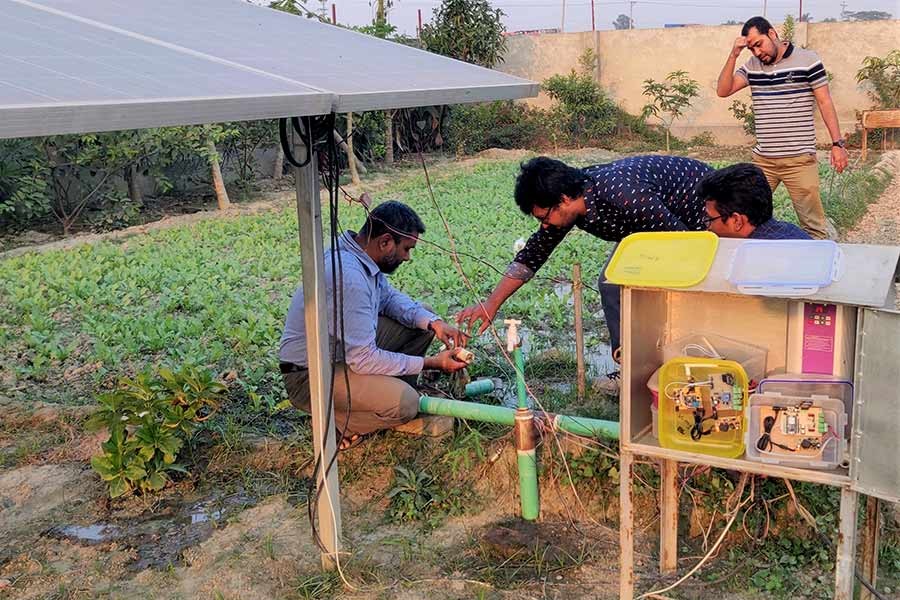
Published :
Updated :

A team of local researchers have successfully devised and introduced a smart irrigation system that can considerably reduce the cost of irrigation and cultivation for farmers in Bangladesh and also cut pollution.
Director of Centre for Energy Research (CER) of United International University (UIU) Shahriar Ahmed Chowdhury led the team in research and developing the system, named 'Smart Solar Irrigation System' or SirriS. The SirriS has been introduced first on pilot basis at Keraniganj and is operating well at a location of this upazila in the outskirts of the capital.

Shahriar Ahmed
Shahriar Ahmed told the FE that currently a staggering number of irrigation pumps are in operation across the country (around 1.58 million), of which nearly 1.22 million run on diesel.
"These (use of a large number of diesel-run pumps) not only take a heavy toll on the farmers, but also harshly impact on ground water level and add to a rising carbon emission in the country," he observed.
Using traditional farming method, the farmers tend to 'over-water' their croplands, he mentioned. "They use 3,000 to 4,000 litres of water to produce one kilogram (kg) of Boro rice. But approximately 1,500 litres of water is required to produce one kg Boro rice," he noted.
He said, excess use of water not only means higher energy consumption, but also higher agricultural production cost. Farming in that method requires adding extra-fertiliser on soil as use of excess water wash the fertiliser out, he stated.
But SirriS does require excess water and fertiliser, according to the inventor of the system.
Once the SirriS is implemented nationwide, it will save nearly six billion litres of diesel and 1500-megawatt of electricity annually, Shahriar Ahmed said.
Controlling and reducing water use in agricultural fields make the production process more efficient and less expensive, he affirmed.
In the prototype smart solar irrigation system, the cost, including all components, is approximately Tk 102,500.
The concept earlier won Innovation Awards from the Ministry of Power, Energy and Mineral Resources of Bangladesh, given during the National Power and Energy Week-2016.
The pilot research has been financially supported by the World Bank and facilitated by the Infrastructural Development Company Limited (IDCOL).
Shahriar Ahmed and his team use sensors to detect the water level and moisture content, temperature of the soil, and control the water flow to the field accordingly.
The system is also equipped with data logging and future water demand prediction facilities promising better water resource management. From the macro-perspective, if adopted nationwide, this can lead to more meaningful estimation of water budgeting for the sector, he narrated.

One of the most unique features of SirriS is the mobile app-based pre-payment feature.
The easy to adopt pay-as-you-go method allows smaller payments at a time, incremental growth and capital cost to recover over time, reducing initial investment hurdle for the farmer.
Such billing system ensures transparency, accountability and thus improved collection efficiency, imparts greater flexibility on part of both the operating authority and farmers, described the researcher.
In the traditional irrigation systems one or more members of the farming families are required to be present near the pump location or in the field during irrigation, he pointed out.
"But SirriS enables mobile app based remote control facilities discarding the notion of constant monitoring of the irrigation process," he said.
This remote controlling can be realised starting from a single pump in a single field to cluster of irrigation pumps installed over an area or region, to even across the nation, he further said.
Besides, a farmer or the owner of the field can observe the irrigation status (total irrigated water, water level or moisture content of the soil, his irrigation credit etc.) from anywhere of the world through the develop web-based dash board or mobile app and also pay through the developed payment gateway, he continued.
An additional co-benefit of SirriS will be any surplus power from the solar PV panels connected to the pumps that can open up further profit-making channels by supplying electricity to rural households and commercial customers.
Besides, scientist Shahriar Ahmed and his CER research team have supported more than 150 solar PV projects at home and abroad.
Shahriar - also a power system and renewable energy expert - has won a good number of accolades, including UN Momentum for Change (Morocco, 2016), Intersolar (Germany, 2016), Education Leadership (India, 2018) and Asian PV Industry Association (China, 2019) awards.
nsrafsanju@gmail.com


 For all latest news, follow The Financial Express Google News channel.
For all latest news, follow The Financial Express Google News channel.